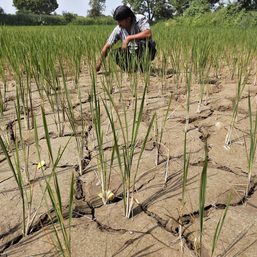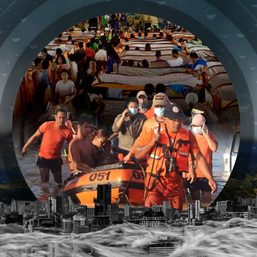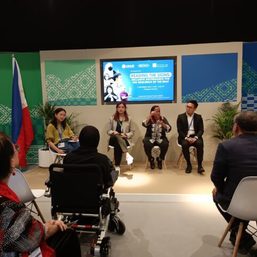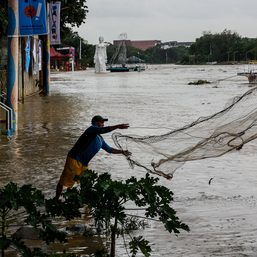SUMMARY
This is AI generated summarization, which may have errors. For context, always refer to the full article.
![[OPINION] Are jeepneys really to blame for the country’s climate change problems?](https://www.rappler.com/tachyon/2020/08/jeepney-phaseout-640.jpg)
The concept of jeepneys as pollutants is a ruse for the real intent of the phase-out: not to alleviate environmental woes, but to push forward the self-serving business agenda of big and well-connected industry players.
In a press statement by the Department of Transportation (DOTr), the department’s chief Arthur Tugade was quoted as saying, “You (jeepney drivers) can work, but do not kill the environment. Work, but take care not to destroy the next generation’s future.”
But are jeepneys really to blame for the country’s climate change problems?
Data from the Department of Energy (DOE) say otherwise, showing power generation accounts for 52% of energy-related greenhouse gas (GHG) emissions in the country, while transportation accounted for only 28% in 2018.
Coal plants and their very dirty emissions
Though our country contributes less than 1% of global GHG emissions, already it has committed to cut it further by 70% by 2030. But how serious is the government in these efforts?
In terms of emission, coal is the most carbon-intensive fuel – a very dirty source of energy. Burning coal generates by-products such as carbon dioxide, methane, particulates and oxides of nitrogen, oxides of sulfur, mercury, and a wide range of carcinogenic chemicals and heavy metals.
Aside from these, other by-products from coal combustion such as wastewater, ash, and leachate also discharge into the environment significant stressors such as selenium, mercury, and arsenic, to name a few.
In Calaca, Batangas, a coal-fired power plant (CFPP) was observed by fisherfolk to have caused a decline in fish catch due to warming water. Doctors also determined that widespread skin diseases and upper respiratory tract infections plague residents living near the CFPP.
Unfortunately, coal has dominated the country’s power generation sector since the implementation of deregulation and privatization in the 80s.
Today, almost half of the country’s generated power comes from coal-fired power plants. As per the List of Power Plants by the DOE, there are 43 CFPPs in the country as of 2018.
Duterte also extols coal’s dominance for the next 30 years. He said he was ready to open the country’s borders for increased trading in big time coal as per an article in Bilyonaryo (an online publication) last July 15, 2020.
This is a 180-degree turnaround from his SONA 2019 declaration to “fast-track renewable energy resources to reduce the country’s dependence on traditional energy sources such as coal.”
So who’s really to blame for the climate change in the Philippines? Largely, it’s the coal-fired plants.
Phase-out unjust, illegal
Transport leaders describe the Duterte government as “heartless and indifferent” to the plight of drivers and small operators who were already suffering due to the months-long lockdown by arbitrarily forcing the jeepney phase-out .
Think tank IBON said that jeepney drivers have lost an estimated P78,000 worth of possible earnings during the three-month lockdown.
IBON also said that traditional jeepneys are safer against COVID-19 compared to its air-conditioned counterparts. Also, recent studies in China have shown that droplet transmissions are more likely to occur in enclosed spaces, with circulation aided by air-conditioning. Regular ventilation, such as those found in jeepneys, reduces the risk of infection.
As early as March, jeepney drivers and operators have proactively undertaken innovations to ensures that physical distancing can still be observed inside jeepneys, among them the installation of plastic barriers and seat designations.
At a time when physical distancing requires that more utility vehicles be available to passengers, the government illogically bans jeepneys from the roads.
Modernization not at the expense of drivers and small operators
Are jeepney drivers and operators’ resistance to the PUV Modernization Program unfounded?
Modern jeepneys are too expensive. A single Euro 4-compliant “modern jeepney” costs between P1 million to P2 million. Even with the loan coming from Land Bank of the Philippines, the cost is way beyond the financial capacity of operators and drivers.
Single-unit jeepney drivers/owners are asked to form cooperatives so they won’t lose their franchise. But in forming cooperatives, they are obliged to produce P800 per day, or P20,000 per month or more in the next 7 years to amortize their bank loans. Jeepney drivers normally earn only P300-P600 daily.
Also, only big businesses can get new franchises as franchise owners should have a minimum of 40 units.
Participatory and empowering, not arbitrary and disenfranchising
What then are the alternatives to just phasing out jeepneys and rendering thousands of drivers jobless, with many having zero means of livelihood?
A transition towards a green economy involving drivers and small operators should first and foremost prioritize the welfare of the people most affected by the shift. Social dialogue is essential. Social welfare programs that comprehensively support workers, who will be among the hardest hit by the modernization, must be undertaken by the government.
A fair transition is a just transition. It is a holistic approach that combines social justice and climate solutions.
A just transition is specifically for workers. According to the International Labor Organization (ILO), “A just transition for all implies that responses to climate change and environmental sustainability should maximize opportunities for decent work creation and ensure social justice, rights, and social protection for all, leaving no one behind.”
Though PUV modernization is said to be unjust, the Philippine government is actually not new to just transitions as a concept and policy framework. A few years back, the Philippines was selected by the ILO for the pilot application of just transitions together with Ghana and Uruguay. Though this is the case, the application of a humane transition remains to be seen.
Dr Luna of the UP National Center for Transport Studies said PUV modernization should not be arbitrary. “Traditional jeepneys should not be banned from servicing the public, but improvement should be done to enhance the quality of service” he said.
He also insisted that that the move from traditional to modern jeepneys should be voluntary, and should be financially supported by the government.
Just transition for jeepney drivers
Jeepney drivers and operators are very vulnerable to the destruction caused by global warming. Calamities destroy their sources of food and shelter. Together with the rest of us, they see the need to protect and care for the environment.
But the transition should not sacrifice their means of livelihood, which they and their families have depended on for decades. It is only just for the government to reward their decades of service to the Filipino people with a sustainable, green, and pro-poor solution.
Only a transition that upholds the welfare and the dignity of workers, including jeepney drivers and small operators, can succeed in forging a just and sustainable low-carbon future in the transport sector of our country. – Rappler.com
Francis Villabroza is a freelance writer. He has contributed articles to alternative media publications. He previously worked as an information officer for the Department of Social Welfare and Development during the term of Professor Judy Taguiwalo.
Add a comment
How does this make you feel?
![[OPINION] In a changing climate, how do we ensure safety and health at work?](https://www.rappler.com/tachyon/2024/04/Climate-change-safety-workers-April-25-2024.jpg?resize=257%2C257&crop_strategy=attention)




There are no comments yet. Add your comment to start the conversation.